Onward Through the Fog with Rob Thomas by Sean Kottke
On more occasions than I care to remember (dating my future wife, teaching a young adult literature class, meeting my wife’s friends and family, Jeopardy! audition – yeah, no joke), I’ve had to follow up my answer to the question “who’s your favorite YA author?” with an immediate “not that Rob Thomas,” which I’ve always chafed at having to clarify, since I knew this Rob Thomas years before I really knew who that Rob Thomas was. This blog isn’t about that Rob Thomas, famous Carlos Santana collaborator who appeared as himself (and met a grisly, albeit fictional, end) in the season two finale of this Rob Thomas’ iZombie. This is about this Rob Thomas, the guy who didn’t start out trying to write YA fiction, yet created a multimedia universe of linked narratives that sold me more on the potential of YA literature to authentically capture the experiences of adolescents and generate social capital in communities of readers than any single author, scholar, fellow educator, or literacy advocate. And here I thought my prime directive as a high school English teacher was to get the next generation excited about Shakespeare.
So, how does this outsider vision play out across Rob Thomas’ books, movies, and TV shows? Glad you asked. Crack open a Dr. Pepper, a Shiner Bock, or, in the words of late great Texas TV newsman Marvin Zindler, “whatever makes you happy,” and read on.
Rob Thomas’ first novel was my gateway drug. I was teaching high school English in Tomball, Texas, and my mentor in English Education, Dr. William Tucker, recommended at an NCTE conference that I give this book a try. Steve York, recently transplanted for his senior year of high school from the Houston suburbs to San Diego, is called to task by his new school’s guidance counselor to explain how a near spotless academic record over five semesters could suddenly come to a halt. “’Do you mind telling me how someone who makes a 760 verbal on his SAT fails English?’ ‘I couldn’t make it all the way through The Outsiders again’” (p. 3). What ensues is a narrative equal parts 1 Henry IV and “Shotgun Willie,” as Steve relates both what brought him to the present day and what transpires over the course of his senior year. He copes with growing up in the shadow of “the astronaut” (aka, his father, Alan York), while “subverting the system” (p. 40) with his friends in GOD, a collective Falstaff to his Prince Hal. With such a pedigree, Steve might be considered the ultimate insider in Houston, but he rejects the claim to the throne based on his reading of his father’s behavior toward his mother before and after his parents’ divorce.
Steve’s coming-of-age moment comes less from defeating an antagonist like Hotspur than from coming to understand errors in his reading of past events. Steve is the prototypical Thomas Austin Slacker protagonist: an outsider seeking community without selling out to an in-crowd conformist mentality. The novel has an ahead-of-its-time edge and authenticity that has since become a hallmark of young adult literature, something noted in retrospect by Thomas. “I didn’t think I was writing a young-adult book. … I knew my central character was an eighteen-year-old. If I was thinking in terms of an audience beyond myself, it was my musician friends in Austin, so I didn’t alter anything. … [T]eenagers don’t live profanity-free, sex-free, drug-free lives” (Cohen, 1997). Incidentally, my first reading of Rats Saw God coincided with the publication of Stephen Chbosky’s The Perks of Being a Wallflower (1999), which deeply impacted my ninth-grade Humanities students. A stirring book talk from the first student in my class to read Perks, a young man who reminded me strongly of Steve York, was the professional slap in the face I needed to embrace YA literature as a vital part of recentering my curriculum around the specific needs of the young, gifted adolescents in my charge, which went way beyond simply grasping the nuts and bolts of the Western canon.
The first of two books concerning the exploits of students of the fictional Deerfield, Texas Robert E. Lee High School, this collection of short stories is presented as the interview responses of nine seniors narrating their experiences in a community service project. The collection is framed by their interviewer Randall, an undergraduate social work student, who illustrates his own skeptical perspective on the high school students’ service projects by narrating his own experience as a Little Brother to a Dallas Cowboys’ quarterback sentenced to community service. “[B]efore [him] I didn’t know shacks from mansions, so excuse me if don’t join the Hallelujah Chorus over three hundred high school kids set loose on the community, blindly colliding, if only momentarily, with real people living real lives. Those lives keep going long after the kids have reduced them to a line on a college application” (p. 19). This outsider perspective is echoed in many of the high school students’ individual stories. In “Loss of Pet,” for example, library volunteer Fiona describes “The Rot”: “It’s the sorority girl who parks in the handicapped zone because she’s still got the permit they gave her when she broke her leg jet skiing. It’s the politician who promises to restore family values. It’s the people throwing ‘Welcome Home’ parties for that boxer who raped a girl. It’s television. It’s every U2 album after War. It’s the women who come in here with black eyes and check out romance novels. It’s sex in general. It’s the jocks at school who whistle at Andrew when he walks down the hall, or the dance team girls who ask me whether I’ve ever seen the sun” (p. 22). In “Half a Mind,” Laura’s outsider status is gradually revealed as the discrepancy between the reality of her service caring for a survivor of traumatic brain injury and her Sweet Valley High-shaped romantic interpretation of their relationship becomes clear. That story presents a riff on Rob Thomas’ own mixed feelings of being perceived as writing for young adults: “You go to the bookstore and my books are always near little kids’ books or Sweet Valley High—all these things I don’t want to be next to. Those are aisles where no self-respecting teenager would go” (Cohen, 1997). Each story plays out like something from O. Henry, with a twist that challenges each narrator to change their assumptions about other people or about themselves. Not all choose to learn something of lasting consequence from their experiences, but all carry onward through the fog.
The second book to feature characters from Deerfield’s Robert E. Lee High School also features multiple narrators, here interleaved into something of an oral history of an annual fundraiser in which students and teachers are auctioned off as “slaves” to do their “masters’” bidding. Included among the narrators are Keene Davenport, an African-American student who plans to protest the horror of a modern, predominantly white high school named after a Confederate general re-enacting slave auctions “for school spirit,” and Shawn Greeley, the African-American student council president genially presiding over the affair. Keene gets the winning bid on Shawn, and uses the opportunity to direct Shawn into darkly satiric behavior that highlights the awfulness of the school’s continuity of this tradition. These events continue to make the novel timely 23 years after it was published, and Keene and Shawn are but two of the outsiders narrating the events of this day.
Tommy Parks, nicknamed “Trailer” as a tease about his neighborhood, carries over from Doing Time, and among the outsiders featured, is most representative of Austin Slacker Charm. In the lower socioeconomic strata of the school population, Tommy hustles between getting by in school by day and working nights at Whataburger (a Texas institution). Without plans to continue his education beyond high school, he places the winning bid on Mr. Twilley, a long-serving history teacher with a reputation for being a stickler and bad memories of Tommy as a student. As in Doing Time, every character faces a moment of reckoning in which their assumptions are challenged and an ethical dilemma presents itself. In keeping with Thomas’ Capraesque vision of community, most dilemmas are resolved in a direction that brings people together, and no one – save for people who commit actual crimes – is incapable of redemption and learning to contribute to a better community. The experience doesn’t fix everything; Mr. Twilley muses about his ex-wife: “[a]s I’m walking, Esther enters my mind. I wonder what she would say about my day. Something about faith in mankind. Something about giving of yourself. And yet, it would still be over between us. Too many things said. Too many things never said” (p. 242). Onward through the fog.
Rob Thomas stretches the outsider concept further in Satellite Down with Patrick Sheridan, a character of faith transported from the small town of Doggett, Texas to Los Angeles, where he is to become the latest student reporter on Classroom Direct, a thinly veiled stand-in for Rob Thomas’ early 90s employer, Channel One News. Patrick is a fish-out-of-water two times over, as a devout Catholic first in heavily Protestant small-town Texas and second in Los Angeles. The broad contours of the story mimic the trajectory of Willie Nelson’s “Bloody Mary Morning,” in which a disillusioned musician flies home to Texas from Los Angeles, as well as any number of cautionary Hollywood tales. One could argue Patrick’s outsider status (as indeed a hostile fan letter he receives does) given that he’s instantly labeled a “two percenter” by the Classroom Direct staff, one who has “the luxury that you can by on your looks. It means that you’re one of the beautiful people for whom everything comes easy. It means you’ll never have trouble getting a job, getting promoted, making friends, getting a loan, getting laid. Being a two percenter gives you the power to just bullshit your way through life” (p. 72). Nevertheless, that’s not Patrick’s lived experience, as he experiences microaggressions related to his small-town Texas background and a constant plea from Hollywood to “get jaded, for chissakes” (p. 83). As he travels around the country (and later, world) covering events for Classroom Direct, his reporter’s eye for detail and awareness of his own positionality as both an outsider and a “two percenter,” depending on the social context, allow him to gather more insights about the world and use his privilege “to expose corruption, afflict the comfortable, [and] defend the people’s right to know” (p. 159). Patrick moves onward through the fog and tries to lift it where he can.
To date Rob Thomas’ only middle grades novel, as well as the only book not to take place in Texas, Green Thumb details the adventures of junior high botany whiz Grady Jacobs. Grady details his outsider status early on: “People think that because I’m smart, I must like school. That’s not true at all. School may be easy, but it’s almost too easy. It’s boring. So what I’m stuck with is spending eight hours a day, five days a week around people who consider armpit noise high comedy. Teachers hate me because I intimidate them. Other kids hate me because I don’t blend in nicely. So, given the option, I’d never show up” (p. 25). Grady experiences bullying, and is clever enough to exact relatively harmless revenge on his tormentors. Soon though, he gets his wish to depart when he is invited to participate in an experiment with “super trees” in the Brazilian rain forest. These super trees are designed to thrive in areas made desert through deforestation, but Grady soon discovers dangerous consequences on the ecosystem as well as a hidden language that allows him to control trees’ reflex actions. Rather than serving as a latter-day Lorax who speaks for the trees, Grady declares “I am Awkye. I bend trees to my will” (p. 102). An outsider among humans, Grady becomes an insider among trees, and enlists the help of the native population (rendered outsiders by corporate interests infringing on the rain forests) to fight for a stronger ecosystem.
This motion picture adaptation of Todd Strasser’s “Time Zone High” novel How I Created My Perfect Prom Date (1996, originally published as Girl Gives Birth to Own Prom Date) doesn’t get a lot of love. Described as “endearingly ridiculous” (Garis, 2015), it boasts a 5.8 out of 10 rating on IMDB.com and a 28% Tomatometer at RottenTomatoes.com (both ratings as of June 8, 2020), and merits nothing more than an off-hand comment in nearly every article on Rob Thomas’ screen work. At least it gets a polite smile and genial shrug from my wife when I mention it to her, who gives it points for featuring former Rob Thomas neighbor Britney Spears’ “(You Drive Me) Crazy” instead of Fine Young Cannibals’ “She Drives Me Crazy” (wow, does Charlotte hate that song). That said, for the Rob Thomas aficionado, the film is no throwaway. Adrian Grenier’s Chase Hammond is as close as Steve York has come to appearing on screen in manner and Austin Slacker Charm. While Melissa Joan Hart’s Nicole Maris is in with the in-crowd and stays there for the whole film, the Pygmalion-esque makeover scheme she unhatches with Chase expands both characters’ worldviews and appreciation of each other’s social scenes. That’s not revolutionary, of course (Breakfast Club, anyone?). In fact, a musical sequence set to Barenaked Ladies’ “It’s All Been Done” (a Charlotte favorite, btw) cheekily telegraphs that to viewers. Rob Thomas’ screenplay is chock-full of Easter eggs from his books, from a subplot involving the school’s own Channel One newscast, a reference to one character “buying Alicia DeGasario at the student council auction last year,” and one outsider character’s revenge on the popular kids via a prank right out of GOD’s playbook. None of those elements are in Strasser’s original novel, and they’re more than gimmicky in-jokes. They’re each integral to the plot of the film, creating a world that mirrors those of Thomas’ novels in an attitude and atmosphere that’s “not completely earnest, yet … not completely ironic.” Is there no better expression of that ethos than featuring the pop punk band The Donnas (performing here as The Electrocutes) covering REO Speedwagon’s “Keep on Loving You” during the film’s climactic dance?
“What I really want to do is replace Nancy Drew as the first name you think of when you think of female detectives” (Rob Thomas, in Solomon, 2019)
Originally conceived as a novel featuring boy detective Keith Mars solving crimes in Austin’s Westlake High School, Veronica Mars has evolved into Rob Thomas’ Rabbit Angstrom, a character we’ve been privileged to see grow from adolescence to adulthood in real time. Across three seasons broadcast first on UPN and then The CW, a Kickstarter funded theatrical film, two novels co-written by Thomas and Jennifer Graham, a webseries spinoff (the very meta Play it Again, Dick), and a fourth season released on Hulu, Rob Thomas’ creation has pioneered 21st century cross-media storytelling and fan culture engagement with the creative process. Old faithful Texas Monthly has documented this well (see Cohen, 2014; Solomon, 2019), and Thomas performed the height of fan service by editing and contributing an introduction to Neptune Noir, a collection of unauthorized acafan essays exploring everything from loving deconstructions of individual episodes to thoughtful positionings of Veronica Mars in the vast library of noir and detective fiction (Thomas & Wilson, 2006).
Nevertheless, Veronica persists, onward through the fog. Although set in the fictional Neptune, California, Veronica and her community are the apotheosis of Austin Slacker Charm, moving forward in uncertainty, working relentlessly toward creating a more inclusive community, never too earnest, never too ironic. Among the “18 More Things to Know About Rob Thomas and Veronica Mars” (Cohen, 2014) is that “Thomas doesn’t forget the little people.” While this refers specifically to the generous opportunities Thomas brings to Austinites, former students, and other collaborators to grow and expand their talents, it’s a hallmark of his storytelling style. Thomas’ sympathies are always with characters who work, whether it’s Veronica hustling as a private detective, Steve York working as a projectionist, Tommy Parks working third shift at Whataburger, the entire Party Down crew catering event after event in Hollywood between auditions, or Olivia Moore eating the brains of recently deceased to help the Seattle police solve murders. These are people doing often unglamorous work, doing it well (not always perfectly mind you, but not incompetently), and making other people’s frequently equally unglamorous lives better along the way.
You might be forgiven a double-take with the last two entries in that list of Thomas characters. Since both Party Down and iZombie (as well as Veronica Mars texts after the show’s original three seasons) deal largely with post-college adults, I’ve opted not to give them as detailed treatment here as the other properties that concern the lives of adolescents and young adults. It’s why I’ve also opted not to venture into the three X-Files novelizations Thomas penned under the name Everett Owens. However, the truth is out there in all of these narrative worlds that Rob Thomas has shepherded into being. That unique mix of earnestness and irony, of Capraesque inclusion and anti-establishment irreverence, all in a package of whip-smart dialogue, this Rob Thomas brings that to all his enterprises, and as we proceed onward through the fog, I can’t wait to see what stories emerge from his mind next.
Cohen, J. (1997, April). Teen idol. Texas Monthly. Retrieved June 1, 2020, from https://www.texasmonthly.com/articles/teen-idol/
Cohen, J. (2014, March). Mission to Mars. Texas Monthly. Retrieved June 1, 2020 from https://www.texasmonthly.com/the-culture/mission-to-mars/
Cohen, J. (2014, March 13). 18 more things to know about Rob Thomas and Veronica Mars. Texas Monthly. Retrieved June 1, 2020 from https://www.texasmonthly.com/articles/18-more-things-to-know-about-rob-thomas-and-veronica-mars/
Garis, M. (2015, September 24). 24 things you notice when you re-watch 'Drive Me Crazy' that are endearingly ridiculous. Bustle. Retrieved June 1, 2020, from https://www.bustle.com/articles/112629-24-things-you-notice-when-you-re-watch-drive-me-crazy-that-are-endearingly-ridiculous
Havrileski, H. (2006). The importance of not being earnest. In R. Thomas & L. Wilson (Eds.) (2006), Neptune noir: Unauthorized investigations into Veronica Mars (pp. 205-212). Benbella Books: Dallas.
Schultz, J. (1999). Drive me crazy [Film]. 20th Century Fox.
Solomon, D. (2019, June 8). What we learned from the ‘Veronica Mars’ panel at ATX Fest. Texas Monthly. Retrieved June 1, 2020, from https://www.texasmonthly.com/the-culture/what-we-learned-from-the-veronica-mars-panel-at-atx-fest/
Solomon, D. (2019, July 19). ‘Veronica Mars’ creator Rob Thomas talks revivals, Texas, and ‘Friday Night Lights’. Texas Monthly. Retrieved June 1, 2020, from https://www.texasmonthly.com/the-culture/veronica-mars-creator-rob-thomas-talks-revivals-texas-and-friday-night-lights/
Strasser, T. (1996). How I created my perfect prom date. Simon & Schuster: New York.
Thomas, R. (1996). Rats saw God. Simon & Schuster: New York.
Thomas, R. (1997a). Doing time: Notes from the undergrad. Simon & Schuster: New York.
Thomas, R. (1997b). Slave day. Simon & Schuster: New York.
Thomas, R. (1998). Satellite down. Simon & Schuster: New York.
Thomas, R. (1999). Green thumb. Simon & Schuster: New York.
Thomas, R. (Director). (2014). Veronica Mars [Film]. Spondoolie Productions, In The Groove, Pace Pictures, Rob Thomas Productions.
Thomas, R., & Graham, J. (2014). Veronica Mars: The thousand dollar tan line. Vintage: New York.
Thomas, R., & Graham, J. (2015). Veronica Mars: Mr. kiss and tell. Vintage: New York.
Thomas, R., Rudd, P., Enborn, J., & Ethridge, D. (Executive Producers). (2009-2010). Party down [TV series]. Slaverats.
Thomas, R., & Ruggiero-Wright, D. (Executive Producers). (2004-2019). Veronica Mars [TV series]. Rob Thomas Productions, Silver Pictures Television, Stu Segall Productions, Warner Bros. Television.
Thomas, R., Ruggiero-Wright, D., & Etheridge, D. (Executive Producers). (2015-2019). iZombie [TV series]. DC Entertainment, Spondoolie Productions, Vertigo Productions, Warner Bros. Television.
Thomas, R., & Stokdyk, D. (Executive Producers). (2014). Play it again, Dick [TV series]. Rob Thomas Productions.
Thomas, R., & Wilson, L. (Eds.) (2006). Neptune noir: Unauthorized investigations into Veronica Mars. Benbella Books: Dallas.
Until Next Time.
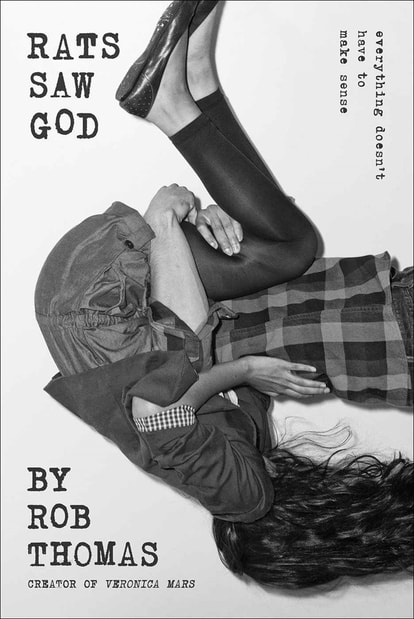
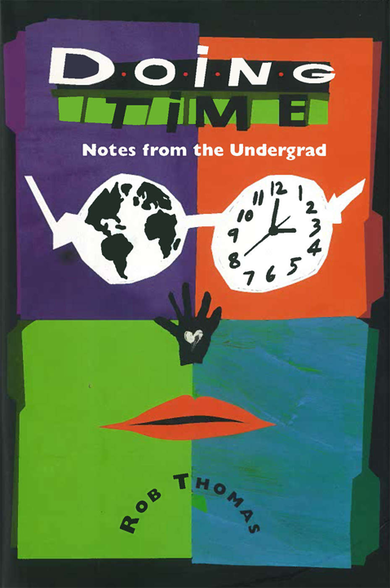
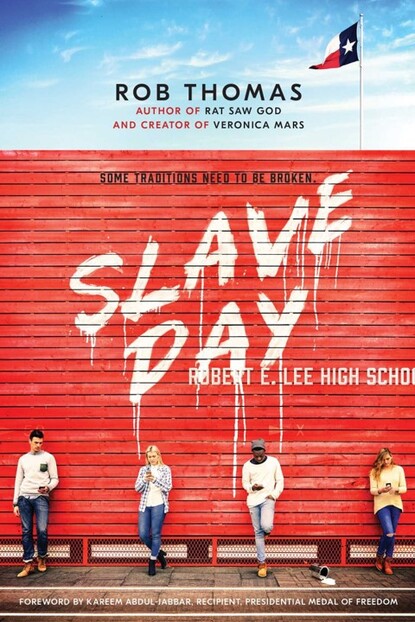
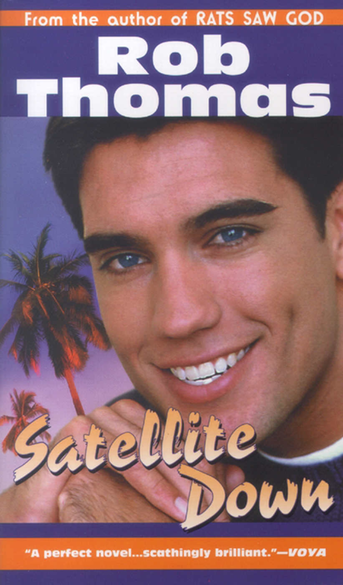
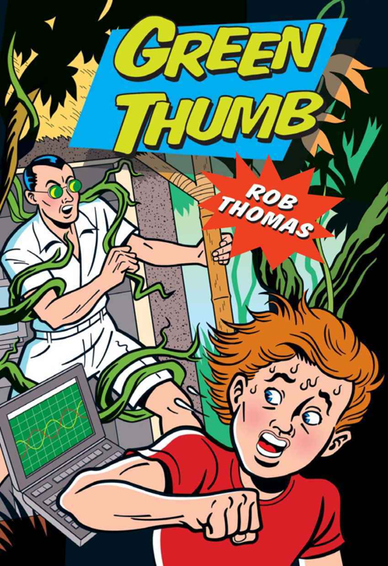
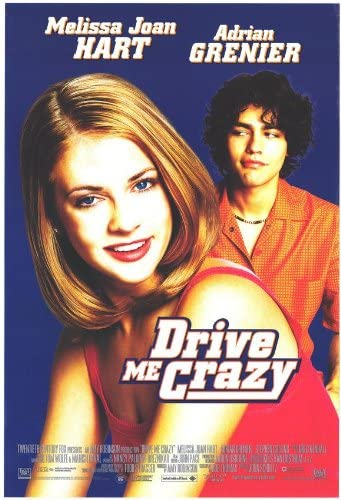
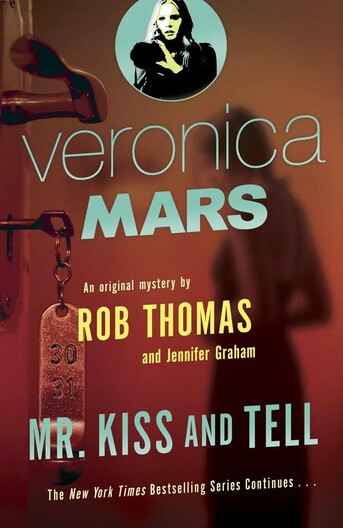
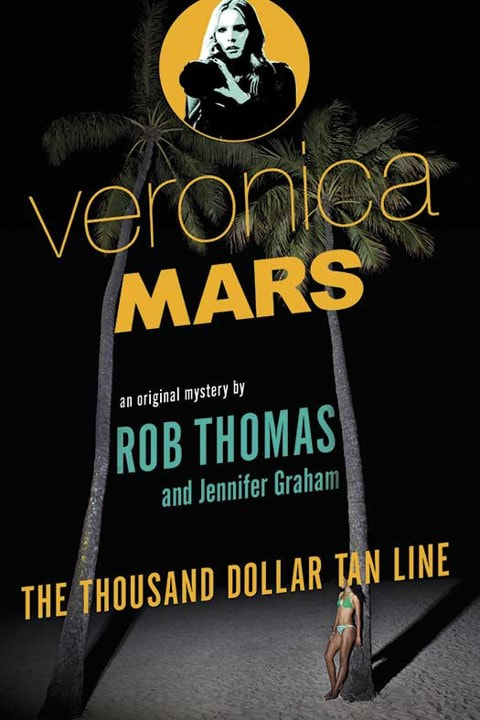

 RSS Feed
RSS Feed